
The first roll call fills the air, as countless men answer with a vote. As it makes its rounds and finally lands upon her, she does not answer at first. A Republican leader, “Uncle Joe” Cannon, advises her that she cannot afford not to vote, since she essentially represents the entire womanhood of the country, and that she must answer one way or another.1 Unbeknownst to the rest of them, lingering in the back of her mind are her brother’s words to vote a “man’s vote” in order to not jeopardize her career, while the pressing weight that the course of her answer has the potential to either hurt or aid the cause of suffrage that she had spent so much time trying to achieve. She was fitted with a choice: potentially hurt the movement and women’s rights, or stand firm by her belief and be risking essentially everything she has worked towards. The chief clerk turned and asked for her vote once more. She stood, moments away from deciding her ultimate faith and the faith of those who supported her. “I want to stand by my country, but I cannot vote for war. I vote no.”2
Jeanette Rankin was the first woman to hold federal office in the United States, and the only Congressperson to vote no against entry into both World Wars. She was born in the rural West of Missoula, Montana, and was the oldest of seven children. Her mother, Olive Pickering Rankin, was a free and adventurous spirit that came to Montana on her own when she was twenty-four, while her father, John Rankin, was a man immersed in his lumber business, leaving the children to grow up in their own ways. Her father, although not always present enough, encouraged Jeanette to exercise a great deal of ingenuity and initiative, always having her hold many responsibilities within the household and within his business. After her father passed and Rankin developed the belief that her teaching profession lacked variation, she went on a trip to visit her brother, Wellington, at Harvard, where she witnessed the suffering of the poor in the slums of Boston and New York. Rankin, in that moment, came to realize how wrong it was for the rich to spend money on luxuries and extravagant lifestyles, while children and adults were on the streets starving. Horrified and inspired by the injustices she came to witness, in 1908 Rankin enrolled at New York School of Philanthropy in order to become a social worker so that she could help those in needs. This shift in careers started a new chapter in her life, one that launched Rankin into a series of events that ultimately led to her career as a politician.3
After graduating and working a bit at an orphanage, Rankin became disappointed in the poor use of her social work and believed it wasn’t enough to bring about a significant impact. She decided to enroll at the University of Washington to study economics, political science, and public speaking, in preparation to work for social legislation. Originally, Rankin attended the university on the reasoning that she would be able to bring about a greater change for more than a couple of individuals at a time. She felt she needed to become more educated on the matter of rights in order to obtain a leadership role, since it was those in higher positions who could bring about a systemic change. Although she set out on the noble cause of helping the less fortunate, Rankin found herself once again changing paths and was thrown into the world of advocating for women’s suffrage.4
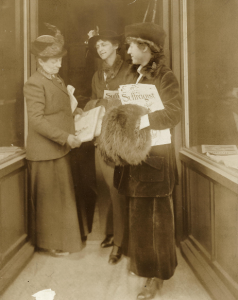
Before definitely joining the ranks of the movement, Rankin first came to believe that in order for conditions to improve, women would need the right to vote. “I saw,” Rankin began, “that if we were to have decent laws for children, sanitary jails, safe food supplies, women would have to vote.”5 With her conviction set in place, in April of 1910, Rankin plastered the university with red and white signs proclaiming votes for women, which, in return, gained the attention of Adella M. Parker, leader of the College Equal Suffrage League and political science professor at the University of Washington. Whether it was by coincident or plain luck, in 1910 a woman’s suffrage campaign in the State of Washington was underway, and Parker persuaded Rankin to work for the upcoming suffrage election in November, to which Rankin agreed.6
The 1910 woman’s suffrage campaign in Washington proved to be successful. The state became the fifth in the country to grant women the right to vote. Building on the momentum of the victory, Rankin officially launched her own political career, and began working for various suffrage groups throughout the country. In the fall of 1910, Rankin was sent to work in Seattle, where she experienced another turning point in her life: being assigned to work with Minnie J. Reynolds. Reynolds was a former Denver journalist and women’s rights activist, who became a mentor to Rankin, as a result of their time working together. However, Reynolds did more than simply keep Jeanette on the path of suffrage; she also introduced Rankin to the cause of pacifism. Reynolds convinced her that the quest for peace should be incorporated into the suffrage question, leading to Rankin taking up a new cause to intertwine with her personal convictions. From 1913 to 1914, Rankin was appointed as a field secretary for the National American Woman Suffrage Association (NAWSA). As secretary, she traveled to fifteen states lobbying for women suffrage. Within that year, Rankin developed valuable organizational and oratorical skills, constantly coordinating events and giving speeches, and continuously advocating for women’s rights.7
Rankin led a successful career within the suffrage movement and she continuously contributed to various victories for the NAWSA. She also held a deep devotion to her home state of Montana. Having grown up in the rugged West, Rankin believed that the physical environment had a profound effect on both men and women through a shared struggle of hardships and frontier burdens. With both sexes equally experiencing the ways of growing up in the West, she recognized how men and women in western states accepted each other as equals to a greater degree than eastern counterparts would.8 With what the belief entailed, Montana still was one of many states that hadn’t passed any sort of ruling to grant women the right to vote. In February of 1911, Rankin decided to change that. She became the first woman in that state to address the state’s legislature, pushing for women’s suffrage. The effort proved to be unsuccessful at first; the people of Montana were reluctant to listen to what Rankin was proposing. Despite the odds, Rankin pushed ahead and continued to press for women’s right in the state. In addition to her work in the NAWSA, Rankin made various visits to Montana to lead the suffrage campaign. Finally, in 1914, Montana passed a law that allowed women the right to vote, becoming the tenth state in the country to do so.9
In 1916, after spending a few more years promoting women’s suffrage, Rankin found herself faced with a choice: continue working for national suffrage, or take advantage of an opportunity to run for Congress from her home state of Montana. After the success of the Montana suffrage campaign, Rankin realized that if she were to run for a seat, she could acquire support from the women of the state, whom Rankin had helped gain the right to vote. On top of all that, Rankin had also found herself having to severe her ties with the NAWSA. In 1915, Carrie Chapman Catt had been re-elected president of NAWSA, an event that disappointed Rankin. Although Rankin had been deeply involved in the suffrage movement, she found herself witnessing a growing rift between herself and Catt long before the election. Catt wasn’t the pacifist that Rankin was, and both women took up opposing positions on the Great War that had been raging in Europe. Their opposing views on war guaranteed a split between them. Instead of continuing down that inevitable conflict, Rankin looked towards using her advantage of being favorably known across the state of Montana and decided to run for Congress. To run a successful campaign, Rankin gained the support of her brother, Wellington Rankin. He equally matched her vision and proclaimed that with his help managing the campaign, she would be elected.10
On July 13, 1916, Rankin declared her candidacy as a Republican for one of Montana’s two House of Representatives seat. Rankin went for a more progressive Republican platform. She advocated for suffrage, for protective legislation for children, for prohibition, and for remaining at peace. Her campaign relied heavily on two factors: election of two congressmen where Montana’s population grew enough to gain the extra seat, and the vote of women within the State. Rankin and her brother believed that with the two seats available, she could easily swing the vote. In addition, Rankin’s campaign catered to not only women and children, but also to men, claiming it was her responsibility to represents both equally to the best of her ability.11 In a similar way, Rankin concluded that her main concern wasn’t that there had never been a woman in Congress before, expressing how her platform wasn’t about making history. “But in a certain sense I feel that it is my special duty,” said Rankin in the course of a conversation. “To express also the point of view of women and to make clear that women of the country are coming to full realization of the fact that Congress is a body which deals with their problems.”12
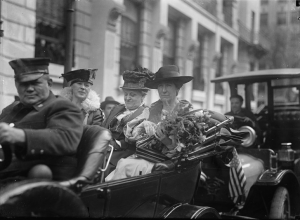
On August 29, 1916, as she and her brother predicted, she ended up winning the second seat with 7,000 votes, topping the third-place candidate who held only 6,000. In that moment, Rankin made history. “I may be the first woman member of Congress,” she observed after her election. “But I won’t be the last.”13 As soon as it became known that Rankin had won, she began receiving telegrams from all over the country congratulating her on her victory. In addition, several suffrage leaders sent messages claiming how her election was a significant victory for women of the country.14 However, despite the upfront positivity she received from many, there were others who refused to validate her win. There were some attempts made to prevent Rankin from taking her seat in Congress, specifically from her opponent, Harry B. Mitchell, who lost to her in the election. They claimed that a woman taking a seat in the House would violate the article of the Constitution, which refers to a member of Congress as “he.” Nonetheless, there was no inclination by the State of Montana’s authorities to withhold Rankin’s credentials. In addition, there was a shared belief that if the House of Representatives made any effort to prevent her from obtaining her seat, Congress would have the entire state of Montana against it, ensuring how Rankin rightfully earned her victory.15
During the months leading up to Rankin’s electoral victory to the House, Rankin was unaware that President Wilson might recommend to Congress that the United States should enter into the Great War in Europe. During that election year, Woodrow Wilson had campaigned using the slogan, “He Kept Us Out of War,” which in no small part led to his reelection that year. Despite Wilson’s posturing to keep the nation neutral and out of war, many events began to shift his perspective. Several international lending policies and continuous trade deals showed that the U.S. government was favoring the Entente powers of England, France, and Russia against Germany, Austria, and the Ottoman Empire. In addition, in January 1917, the Germans renewed their use of unrestricted submarine warfare on all ships bound for British ports, including ships that might have Americans on board. The final tipping point came with the interception of the Zimmerman note sent from Germany to Mexico. In early March, British intelligence had intercepted the message from Germany suggesting an alliance with Mexico, such that Mexico might regain southwestern territories it had lost in its war with the United States in 1846. In light of that recent event, Wilson’s cabinet recommended that he ask Congress for a declaration of war. Although he hesitated at first, Wilson finally agreed.16
In February 1917, with the growing situation of the Great War intensifying, Rankin and Wellington went to New York to stay with some friends. One evening, they were guest at the house of Mr. James Lees Laidlaw, president of the New York State Men’s League for Women’s Suffrage. Rankin gave her first newspaper interview since her victory. The interview largely focused on Rankin’s political views, and how she would begin her work as a congresswoman. However, Rankin refused to comment on a lot of the questions, focusing more on her desire to work for the benefit of children and their wellbeing, plus her promise to work for an amendment to the U.S. Constitution for full woman suffrage.17 On March 2, Rankin delivered her first official address at Carnegie Hall. Once again, Rankin avoided any talk about foreign policies, specifically on her position on the war. Similar to her interview with the newspaper, she emphasized her progressive political reforms, aware that if she divulged her views on the war, those views would be all that she would be known for, limiting the other concerns she wanted to fight for. Although Rankin avoided the topic of the war, it was no secret that she was a pacifist in her own personal conviction. Rankin had greatly admired women like Jane Addams, a well-known pacifist, but never formed close associations with other female reformers nor joined any groups clustered around places like Hull House. Nevertheless, Rankin refused to state whether she was a pacifist publicly when the debate on the U.S. entry to the war began. But there still were many who knew of her peace policies.18
On the morning of April 2, 1917, Congress was due to convene after Wilson called a special session that day in Washington D.C., requiring Rankin’s attendance. Before heading to the Capitol, some prominent women’s suffrage organizations hosted a breakfast in Rankin’s honor at the Shoreham Hotel. There were crowds of women, some suffrage leaders of all generations, celebrating Rankin’s accomplishments. They showered her with praise and honor, indicating how impactful her achievements had been on women’s rights. After the breakfast, a twenty-five-car motorcade then took Rankin to the NAWSA’s headquarters, where she rode alongside Carrie Chapman Catt, despite both having an unspoken tension between them. At the headquarters, Rankin spoke to an excited crowd, giving her first public address.19 In that moment, as Rankin stood upon that balcony, she became a symbol: the first woman to serve in the House of Representative. Although the occasion marked a historical event, Rankin held the position to the same standards of any other Congressman; her duty was to fight for those who need the most help, whether it was women’s suffrage, child rights, or even lesser-known causes like prison reform. She saw, as Congresswoman, it was her obligation to fulfill her campaign promises to her state and not simply maintain her newfound popularity, which would later cost her.
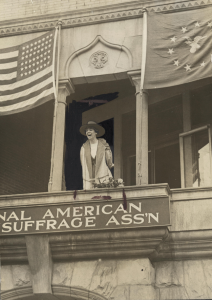
Shortly after her address, Rankin’s Montana colleague, John Evans, escorted her into the House chamber. Rankin was introduced on the floor of the House of Representatives as its first female member, where she and Evans were sworn in by speaker Champ Clark of Missouri. After she was inducted, the chamber broke out in sustained applause. She was officially the first Congresswoman to hold office, and with the title came impossible standards and expectations that she would be held to. In that very same evening, President Wilson asked Congress to declare war on Germany, justifying the action as a way to “make the world safe for democracy.”20 Rankin was now required to cast her first ever vote in Congress, but on the issue of war, a topic so intertwined with various causes that Rankin had fought for, that no matter what she voted, she would disappoint a lot of people. In her campaign, Rankin had originally promised to do everything she could to keep the country out of war, but at what cost? Wellington and Harriet Laidlaw, wife of James Laidlaw, were well aware of Rankin’s pacifism, and believed it would ruin her political career and future. They maintained that Rankin should support the U.S. entry into the war, to stand by the president and ensure her reelection for the next term. There were even some suffrage leaders, many who attended the breakfast in Rankin’s honor, who reminded her that her vote could essentially compromise the cause of suffrage. If she opposed the war, it might lead to women being seen as weak and unfit for politics. Although there were many who were afraid that Rankin’s antiwar policies could harm the suffrage movement, others, like Alice Paul, another women’s right activist and pacifist, asked her to oppose the war despite the odds. Rankin, herself, knew her vote of “no” would not be a decisive vote, where others agued, mostly her brother, that her opposing the war would be a needless sacrifice. With all these suggestion from the various people who knew her, Rankin opted to listen to them, and not vote until the last possible moment, in case she might find a reason that could morally justify the need to go to war.21
Four days after being introduced into the House, and four days of constant advice and recommendations, and four days of an internal debate, Rankin cast her first ballot in Congress. As she would later claim, “the first vote of the first woman member of Congress was a vote against war.”22 Although there were also around fifty men who opposed going to war, Rankin’s vote was the only one that anyone cared about, since it was the first vote in Congress to come from a woman. In the coming days, Rankin was attacked nationally for her vote. Several people criticized her judgment and believed that she should resign from her position before she could make any more horrific mistakes in office. Wellington went as far as to blandly tell Rankin that she was not going to be re-elected, claiming her decision costed her her political career. “Never for one second could I face the idea that I would send your men to be killed,” Rankin began, “for no other reason than to save my seat in Congress.”23 Although Rankin made the choice not for her own benefit, but out of loyalty to her personal values, the hardest thought to bear was the notion that her vote had caused harm to the suffrage movement. Several suffragists canceled meetings where Rankin was going to give speeches. It was also noticeable that groups like NAWSA distanced themselves from her. However, there were many other women that claimed that no matter which way she would have voted, it would still have cost the movement tons of support. Probably the most notable backlash came from her home state of Montana. Rankin, during her campaign, had judged the sentiment in Montana to be overwhelmingly against war, believing that they would support her decision in Congress with open arms. Regardless, as the situation changed when the vote was taken, Rankin quickly realized that Montana didn’t take kindly to her initial resolve. She received letters and telegrams that were sixteen to one against the war resolution, adding the final nail in Rankin’s coffin.24
Overall, Rankin did receive heavy backlash for her vote of “no,” but she did also have several people who defended her principle of being against war, some coming from surprising places. In spite of their rocky history, Carrie Chapman Catt excused Rankin for voting against the war resolution, claiming she had the right to vote as her conscience dictated. Catt indicated that no matter which way Rankin voted, she would be criticized, and that Rankin had nothing to be ashamed of since she was only doing her duty as it appeared to her. Although Catt was one of many pushing Rankin to vote for war, Catt still believed that the choice was not for anyone else to make except Rankin. Granted that Catt did ease some of Rankin’s personal demons surrounding whether she did harm to the suffrage movement, she reminded the public that Rankin was not voting for the suffragists of the nation, but only that she represented Montana at the end of the day. In addition to Catt’s pardoning of Rankin, Harriet Laidlaw defended Rankin’s choice, despite Laidlaw being one of the more openly known voices telling her to vote in favor of the resolution. After the vote had been cast, there came a story that Rankin wept upon voting, which bolstered the idea that women were unfit to make impactful decisions. However, countless congressmen and other individuals testified that Rankin did not cry, claiming that if she did, it showed no more of a weakness than her fellow congressmen who shared the same reaction. Mrs. Laidlaw, who was present during the vote, argued that Rankin, who was undergoing the most terrible strain, was perfectly composed when she finally gave her decision. Harriet Laidlaw was one of few that knew that Rankin was struggling with the wish to do what many suffrage leaders asked of her, what she knew would be popular, and sticking to her own devotion to her antiwar policies; “When she finally voted, she voted with intense sincerity, knowing that she was not doing the popular thing, but refusing to allow herself to be governed by motives of expediency. She just couldn’t vote for war.”25
As expected by countless people, Rankin ended up not winning reelection in 1919. She had missed the Republican nomination for senate by five percent, blamed mostly on her anti-war views. She then tried to run under the Nationalist Party, resulting in the same verdict of not getting the votes she needed. Despite not winning her seat again, during her term, Rankin managed to accomplish a lot in Congress. She advocated to protect civil liberties, pushed steadily for suffrage, and looked to increase social reform. She campaigned for government to hire more women, for states to improve conditions for imprisoned inmates, and for an increase of food, shelter, and care for children in poverty. Finally, Rankin initiated and participated in various debates on a federal amendment for women suffrage. The 19th Amendment was passed after Rankin left office the same year. Although her vote of “no” against the Great War had drastic consequences, Rankin never regretted her vote once. She consistently held the strong belief that the issue of peace was a woman’s issue, and no amount of criticism could bend her principles. Rankin made history as the first woman to hold office in Congress but made herself known through her pacifistic views. She constantly changed career paths throughout her life, always seeking for a way to bring about the greatest impact overall, only to find it in politics. And when Rankin found herself backed into a corner with the weight of women’s rights on her shoulder, she could have easily gone the popular route and protected her career in the process. Instead, she stayed true to herself and to her values, committed to the idea that war brings nothing but travesty. “The peace problem is a woman’s problem…Therefore peace is a woman’s job.”26
- Norma Smith, Jeannette Rankin, America’s Conscience (Montana Historical Society Press, 2002), 112. ↵
- Nancy F. Cott, History of Women in the United States: Historical Articles on Women’s Lives and Activities, vol. 15. Women and War, 20 vols. (K.G.Saur, 1992), 257. ↵
- Norma Smith, Jeannette Rankin, America’s Conscience (Montana Historical Society Press, 2002), 52-54. ↵
- Norma Smith, Jeannette Rankin, America’s Conscience (Montana Historical Society Press, 2002), 238-239. ↵
- Norma Smith, Jeannette Rankin, America’s Conscience (Montana Historical Society Press, 2002), 55. ↵
- Norma Smith, Jeannette Rankin, America’s Conscience (Montana Historical Society Press, 2002), 55-56. ↵
- Norma Smith, Jeannette Rankin, America’s Conscience (Montana Historical Society Press, 2002), 239-240, 249. ↵
- Nancy F. Cott, History of Women in the United States: Historical Articles on Women’s Lives and Activities, vol. 15. Women and War, 20 vols. (K.G.Saur, 1992), 249. ↵
- Norma Smith, Jeannette Rankin, America’s Conscience (Montana Historical Society Press, 2002), 239. ↵
- Norma Smith, Jeannette Rankin, America’s Conscience (Montana Historical Society Press, 2002), 241. ↵
- Louis Levine, “First Woman Member of Congress well versed in Politics: Miss Jeannette Rankin of Montana Has Had Long Experience as Campaign Worker for Woman Suffrage,” New York Times, November 19, 1916. ↵
- Louis Levine, “First Woman Member of Congress well versed in Politics: Miss Jeannette Rankin of Montana Has Had Long Experience as Campaign Worker for Woman Suffrage,” New York Times, November 19, 1916. ↵
- Winifred Mallon, “An Impression of Jeannette Rankin,” The Suffragist, March 31, 1917. ↵
- “Miss Rankin Elected: Montana Woman Will Be the First to Sit in Congress.,” New York Times, November 11, 1916. ↵
- “Won’t Fight Miss Rankin: And Defeated Opponent Wouldn’t Accept Her Seat in Congress,” New York Times, November 19, 1916. ↵
- Nancy F. Cott, History of Women in the United States: Historical Articles on Women’s Lives and Activities, vol. 15. Women and War, 20 vols. (K.G.Saur, 1992), 257. ↵
- “Jeanette Rankin Here: Woman Representative from Montana to Represent All Parties,” New York Times, February 25, 1917. ↵
- Nancy F. Cott, History of Women in the United States: Historical Articles on Women’s Lives and Activities, vol. 15. Women and War, 20 vols. (K.G.Saur, 1992), 256-257. ↵
- “Miss Rankin Stands by The Republicans: New Congresswoman Will Support the Caucus Voting for Speaker,” New York Times, April 2, 1917. ↵
- Nancy F. Cott, History of Women in the United States: Historical Articles on Women’s Lives and Activities, vol. 15. Women and War, 20 vols. (K.G.Saur, 1992), 257. ↵
- Norma Smith, Jeannette Rankin, America’s Conscience (Montana Historical Society Press, 2002), 110-113. ↵
- Norma Smith, Jeannette Rankin, America’s Conscience (Montana Historical Society Press, 2002), 112. ↵
- Norma Smith, Jeannette Rankin, America’s Conscience (Montana Historical Society Press, 2002), 114. ↵
- Nancy F. Cott, History of Women in the United States: Historical Articles on Women’s Lives and Activities, vol. 15. Women and War, 20 vols. (K.G.Saur, 1992), 259. ↵
- “Suffrage Leaders Pardon Miss Rankin: Regretting Her Action, They Say She Did Her Duty as She Saw It,” New York Times, April 7, 1917. ↵
- Nancy F. Cott, History of Women in the United States: Historical Articles on Women’s Lives and Activities, vol. 15. Women and War, 20 vols. (K.G.Saur, 1992), 251. ↵
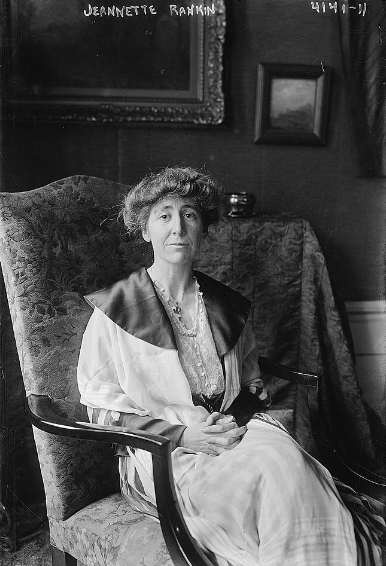

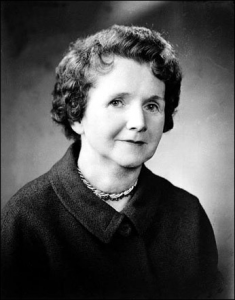
27 comments
LEE
Hello I really like this article that says about Jeannette Rankin. This is such a nice topic and interesting to talk about. I really like the way you chose her as a topic and tried to introduce her. It was my first time hearing stories about Jeannette Rankin but i really enjoyed it. I want to like to introduce this article to my friends and fellows to read. Thank you
Sebastian Hernandez-Soihit
This article on Jeannette Rankin and her pursuit of peace and women’s suffrage is an enlightening and well-written piece. An excellent job of highlighting Rankin’s contributions to the women’s suffrage movement and her tireless efforts to promote nonviolence and diplomacy in the face of conflict.
Alexis Zepeda
Hello! Congratulations on publishing a great article! In reading articles on more women who have fought for women’s suffrage such as this one, it is astonishing to see how far we have come. I think in this article, her story and experiences are captured very well. Great job!
Olivia Flores
Congratulations on your winning this article definitely deserved it! This was one of the first women to make an impact in politics, and especially during this time where the patriarchy was so dominating. It is nice to hear that she took her stance and helped so much in the women’s suffrage movement. She is an impactful leader that we all need to hear more about. Such an amazing article.
Amy Hotema
Although it makes perfect sense, I was unaware that the first congresswoman was a pacifist. I adored how this narrative was presented so elegantly and well. It is such a significant historical event that I regret not learning about it earlier. Even today, American politics is still a males’ club, and the majority of women who succeed in getting a place at the table do so at the cost of part of their femininity and morals. Being a trailblazer while still being steadfast and casting a vote that exemplified the compassion, wisdom, and courage that women can bring to public service inspires me.
Lauren Deleon
I was unaware that the first congresswoman was a pacifist but it makes perfect sense. I absolutely loved how told this story so gracefully and effectively. It is such a poignant moment in history that upset I didn’t know about it before. To this day American Politics is a boys club and most of the women who manage to get a seat at the table have to sacrifice some of their feminity and values to do so. It is inspiring to me that Rankin was a trailblazer but at the same time stuck to her convictions and voted in a way that exhibited what women have to offer in public office compassion, intelligence, and courage.
Kayla Braxton-Young
First of I want to start off by saying congratulations on your award. This is a very nice well written article. I really enjoyed reading this article, and the topic was very interesting. I have never read an article like this before, so reading this article was very interesting for me. I didn’t know about Jeanette Rankin or who she was until I read this. See in school, we don’t really learn about these types of important people, information is just left out, so we have to do the research on our own. I am glad I read this article because now I know who this is, why she is important and why she is a strong person.
Sudura Zakir
The article was well narrative and inspiring with sharing some ancient moments of Jeanette. It depicts true feminism and motivating women to remain firmly determined. Taking such step as a first women in the federal office and voting “No” against world wars awesome and tough step taken by her. Although she is unfamiliar to many people but her remarkable work
created huge impact. Rankin is an amazing example of many people in present age what she did in that past will influence women from modern time.
Christian Guerrero
Hello,
Congratulations on your nomination! This was an interesting article and it actually compliments previous research of feminism in the upcoming years of the 1800s and 1900s. I’ve taken a class with Professor Coley and I enjoy applying what I learned to what this paper talks about. I kind of see how women’s suffrage was parallel to segregation as both finally achieved what they were fighting for yet they still received somewhat of the same criticism and biased over abolishing segregation and having women vote.
Analyssa Garcia
Hi Serenity,
This is such a well done article. I am a strong activist for exercising your right to vote and I know just how important it is. I really enjoyed reading about this and I appreciate how informative it is. I think now more than ever, people should realize the obstacles we faced to get the right to vote, but now as we are fighting to KEEP that right. There are burdens constantly being set and it is not right. Great job, I really enjoyed this.